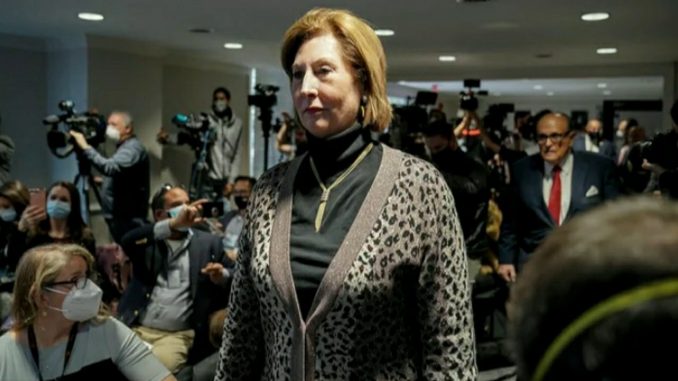
A federal judge in Washington, D.C., on Wednesday rejected requests from former Trump personal attorney Rudy Giuliani, pro-Trump lawyer Sidney Powell and MyPillow CEO Mike Lindell that he dismiss lawsuits from Dominion Voting Systems against the three.
The ruling pertains to three defamation lawsuits Dominion filed — at $1.3 billion each — against the three defendants for allegedly claiming without evidence that the voting machine company rigged the 2020 presidential election for President Biden by manipulating votes.
The ruling by U.S. District Judge Carl Nichols, a Trump nominee, swept aside the initial claims put forth by the defendants for why the suits should be tossed, from arguments that their alleged statements were legally protected opinions or were otherwise made without malicious intent to claims that the D.C. court lacked jurisdiction to hear the case.
The Wednesday order clears the way for the litigation to proceed. Separately, Dominion this week also sued a pair of far-right media companies and the former head of Overstock.com for defamation based on statements made about the 2020 election.
If Dominion’s legal effort ultimately proves successful, it would further undercut the unfounded narrative pushed by President Trump and his allies that the election was stolen from him due to widespread election tampering and voter fraud. To date, Trump’s allegations have not been able to withstand scrutiny in the courts, but they have stirred outrage among his supporters, including on Jan. 6, when a mob of his supporters stormed the U.S. Capitol in a violent riot.
In a 44-page opinion, Nichols first focused on the case against Powell, whom Dominion blamed for helping incite the riot, writing in its complaint that the demonstrators were “fueled by the disinformation campaign launched and sustained by Powell in concert with her allies and like-minded media outlets.”
Dominion, in its January complaint, alleged that Powell promoted “a false preconceived narrative” about the 2020 vote, which included unsubstantiated claims that the company was established in Venezuela as part of a vote-rigging operation in favor of the late socialist leader Hugo Chávez and that Dominion bribed state officials in Georgia to secure its contract.
Nichols flatly rejected Powell’s assertion that her statements could not be defamatory because they were not statements of fact or otherwise were protected speech because they occurred during the rough-and-tumble of the election.
“The question … is whether a reasonable juror could conclude that Powell’s statements expressed or implied a verifiably false fact about Dominion. This is not a close call,” Nichols wrote. He added that “it is simply not the law that provably false statements cannot be actionable if made in the context of an election.”
Both Powell and Lindell have urged the court to find that Dominion, for legal purposes, should be considered a “public figure,” which would raise the legal bar that Dominion would have to clear in order to win its case.
Among the allegedly defamatory statements that figure into Dominion’s suit against Lindell is the MyPillow CEO’s claim that on election night Trump’s lead was so great that it “broke the algorithm” in the Dominion machines that were programmed to give more weight to votes cast in favor of Biden.
Lindell and Powell, in their motions to dismiss, claimed that their statements were not made with “actual malice” or reckless disregard for the truth, the legal standard that applies in defamation suits filed by public figures.
But Nichols, in his ruling, found that Dominion “has adequately alleged that Lindell made his claims knowing that they were false or with reckless disregard for the truth.” Similarly, as to Powell, the judge found that Dominion had made a sufficient showing that she made her claims knowing that they were false, or at least with serious doubts as to their truthfulness.
Dominion’s lawsuit against Giuliani alleged that the former New York City mayor continued to falsely accuse the company of fixing the 2020 presidential election by manipulating votes even after independent audits and hand recounts disproved his claims.
The January complaint also noted that while Giuliani lodged numerous accusations against Dominion in media appearances, he was unwilling to do so when he represented the Trump campaign in federal court in Pennsylvania, where he would risk sanctions for knowingly making false statements.
In response to the lawsuit, Giuliani filed a motion to dismiss that was narrower in focus than the other two defendants’ briefs. In a 10-page filing in April, Giuliani did not specifically address the merits of Dominion’s claims but instead argued Dominion failed to satisfy procedural requirements for such cases.
Giuliani’s claims, including that the Dominion plaintiffs had failed to adequately demonstrate a legal injury, were all denied by Nichols.
Via The Hill


